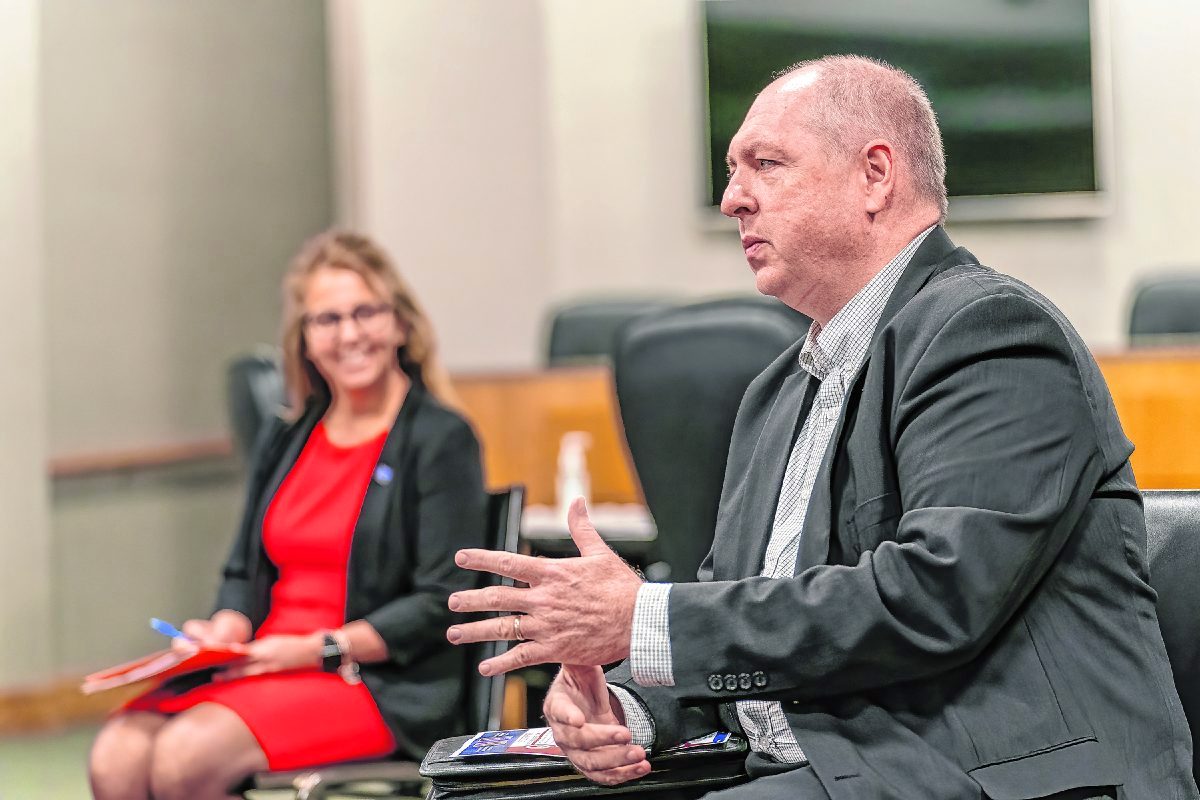As the legislative session prepares to wrap up this month, local state lawmakers tuned into their constituents’ concerns this weekend.
Reps. Michelle Davis, R-Whiteland, and John Young, R-Franklin, along with Sen. Greg Walker, R-Columbus, met with a room full of concerned citizens for a town hall Saturday morning at the Greenwood City Center. Another was planned Saturday afternoon in Franklin.
All three lawmakers provided updates, saying the theme of this year’s legislative session was “adapting to a new normal.” The House is meeting in the Indiana Government Center South, instead of its chambers, which took some adapting to, Young said.
A common theme among legislation was changing certain practices to adapt to the pandemic, such as laws allowing the remote signing of legal documents, as well as telehealth visits and over-the-phone prescriptions, lawmakers said.
“There were dozens of issues that were similar in terms of we made changes because we had a new normal, and we’re trying to make the new normal work,” Walker said.
Young touted the passing of Senate Enrolled Act 1, which gives civil immunity to businesses and health care organizations to prevent lawsuits relating to damages caused by or exposure to COVID-19, a success. It was one of the first bills Gov. Eric Holcomb signed into law this year.
Then, lawmakers spent about an hour and a half listening to concerns from constituents and answering questions about hot topics such as constitutional carry, local government control and redistricting.
Greenwood resident Jay Hart questioned Walker about the fate of House Bill 1369, which would have eliminated carry permits for handguns in Indiana. The bill died in the Senate last week after the chair of the Judiciary Committee did not give it a hearing in time for the deadline.
The bill seemed to have momentum until it got to the Senate; it passed through the House quickly.
Walker said he did not support the bill because a number of organizations were against it, including the Indiana State Police. He added even if the bill passed, most Indiana residents would still have to carry a permit anyway when traveling to other states. There were also some disagreements between the House and Senate on the language in the bill, he said.
Hart disagreed with Walker, and asked why a permit was needed for a “God-given right.”
A five-year conceal carry permit in Indiana is free, and a lifetime carry permit may soon be free too if the Senate passes a resolution to do so, Walker said.
“Indiana respects and has always respected the freedom to defend oneself, and it’s in our Indiana Constitution as well. This is not even a question of the Second Amendment,” Walker said. “Indiana says you have a personal right to carry, I recognize that, and I respect that.”
Ron Deer, a Johnson County Council member, brought up concerns about the state trying to overstep local government control with certain legislation. He specially pointed to House Bill 1361, which would set minimum standards for commercial wind and solar energy projects that would apply to the whole state, taking that zoning control away from local governments.
Davis and Young voted against the measure in the House, and the bill is currently in the Senate. Walker said he also opposes the bill, and voted against it in committee.
“This bill puts the state of Indiana in the firmest driver’s seat on local zoning more so than any other issue I’ve ever seen,” Walker said.
This bill is complicated and has been “rushed to the finish line” because lawmakers do not want local communities to really understand what it does, he said.
“As the bill is amended today, it’s been characterized as an offering of a carrot rather than a stick,” Walker said. “But what I look at it as is we’re going to beat you with the stick, we just painted it orange.”
Walker and Young both said they do not discount the importance of addressing renewable energy production in the state, but taking away local control was not the way to do it.
Redistricting was also addressed. One resident asked what the process will look like, and if there will be transparency about meetings in which the lines are redrawn.
All states redraw boundary lines every 10 years, after the Census, and it affects every political seat from the state’s congressional members, to the Statehouse and even local municipal seats. The majority party in the General Assembly — the Republican party — is in charge of drawing, and a lot is typically done during closed door meetings of the legislature.
Young said many aspects have to be considered when redrawing district lines including geography and population density. When the lines are drawn, the state legislature will have to vote on the new map, and all those discussions are open to the public, he said.
Politics do come into play with redistricting, and that is unavoidable, Walker said.
“Even the United States Supreme Court has said we will not intervene in redistricting when it’s political just because it’s political,” Walker said. “The effect has its political effect … if you don’t like the ones who draw the districts, when you get the chance to vote them out, vote them out.”





